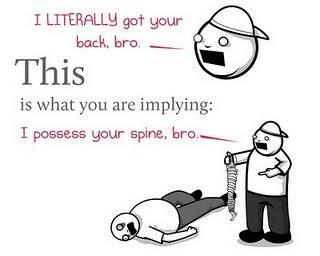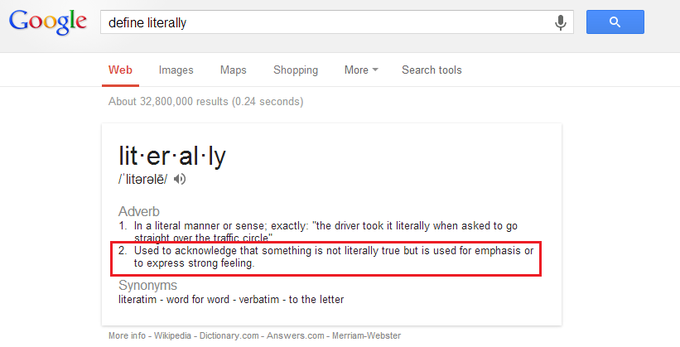About
“Literally” is an English adverb indicating words should be interpreted in their basic meanings without metaphor or allegory. The word is often used for emphasis in place of its antonym “figuratively,” which has led to an ongoing semantic debate online.
Origin
According to the Online Etymology Dictionary,[1] the word “literally” was first used as “in a literal sense” in the 1530s. According to National Geographic,[2]“literally” was first substituted for “figuratively” in the 1769 novel The History of Emily Montague by author Frances Brooke:
“He is a fortunate man to be introduced to such a party of fine women at his arrival; it is literally to feed among the lilies.”
In 1903, the Oxford English Dictionary[3] added a corollary definition of the word in its colloquial meaning:
Literally (adj. colloq.): Used to indicate that some (freq. conventional) metaphorical or hyperbolical expression is to be taken in the strongest admissible sense: ‘virtually, as good as’; (also) ‘completely, utterly, absolutely’.
The earliest known work of parody to poke fun at the indiscriminate use of “literally” in everyday conversations can be attributed to a MADtv sketch series starring comedians Michael McDonald and Nicole Sullivan as Clyde and Judith, a married couple from L.A. who frequently use the word “literally” while insulting, annoying, and angering the people around them. The pilot sketch of the “Literally” series was originally aired as part of MADtv’s Season 5, Episode 12 on January 8th, 2000 (shown below).
Spread
On November 17th, 2004, Urban Dictionary[10] user Built2Spill submitted an entry for “literally,” noting that it is often confused with “figuratively.” On April 9th, 2010, the webcomic Xkcd[6] published a comic titled “Literally,” in which a stalker shames a man for using the word after watching him for nearly two decades (shown below).
On September 21st, the webcomic The Oatmeal[4] posted a comic mocking those who used the word “literally” as “figuratively” (shown below).
On August 12th, 2013, Redditor pikagrue submitted a post titled “We did it guys, we finally killed English,” featuring a screenshot of Google’s secondary definition for “literally” (shown below). Prior to being archived, the post gathered upwards of 2,700 votes (93% upvoted) on the /r/funny[9] subreddit.
In April 2014, developer Mike Walker released a Google Chrome[7] browser extension that replaces the word “literally” with “figuratively.” On November 5th, Redditor kabukistar challenged the use of “literally” as “figuratively” in a post on the /r/changemyview[8] subreddit, where it gained over 862 votes (86% upvoted) in the first week. On November 12th, Time Magazine[5] included “literally” in a poll to determine “which word should be banned in 2015.”
Notable Examples
Parodies
In addition to the MADtv sketch series, the overuse of the word “literally” has been a popular subject of numerous web comedy sketches on YouTube, which began with the premiere of BYUtv’s web series Captain Literally in April 2013 (shown below, left) and continued with vlogger Mikey Bolts’ satirical commentary on the phenomenon in April 2014 (shown below, right).
In August 2014, Jack Douglass released a short comedy sketch titled “Literally” (shown below, left) and College Humor also released a fairytale-style parody video titled “The Boy Who Cried Literally” (shown below, right)
“Literally Hitler”
“Literally Hitler” is a hyperbolic expression that can be used to denounce an individual or group as being worse than the German Nazi dictator Adolf Hitler. On Reddit, the phrase is also used to mock circle jerk discussions that ultimately manifest into examples of Godwin’s Law.
“Literally, I Can’t Even”
“Literally, I Can’t Even” is an Internet slang expression used to indicate that the speaker is in a state of speechlessness, either as a result of feeling overjoyed or exasperated, depending on the context in which it is said. Due to its incomplete sentence structure, the adverb “even” in the expression can be interpreted as a substitute verb for “manage.” On Tumblr, the phrase is often used to caption reaction images in which the subject collapses in frustration or bewilderment.
Search Interest
External References
[1]Online Etymology Dictionary – literally
[2]National Geographic – The Literal Truth About The Word Literally
[3]Oxford English Dictionary – literally
[5]Time – Which word should be banned in 2015?
[8]Reddit – CMV– Using literally to mean figuratively
[9]Reddit – We did it guys we finally killed English
[10]Urban Dictionary – literally
[12]Planet MADtv – [MADtv] Literally




